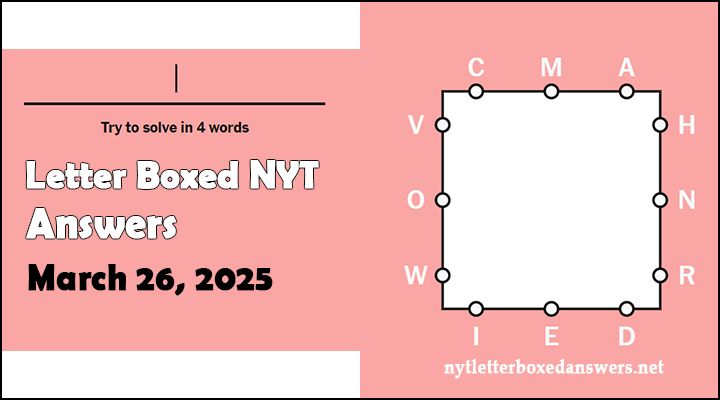NYT Letter Boxed quiz for Wednesday March 26, 2025 is released. We came up with Letter Boxed March 26 2025 Answers and Hints for you. With the help of these hints, you will be able to guess the words of letter boxed quiz without revealing the answers and get the solution.
| Top | Right | Bottom | Left |
|---|---|---|---|
| CMA | HNR | IED | VOW |
| Two Words Solution | |
|---|---|
| HAIRWEAVER | RICHMOND |
| HEAVENWARD | DAEMONIC |
| WHICHEVERE | RANDOM |
| CHAWDRON | NEVERMIND |
| Three Words Solution | ||
|---|---|---|
| ADVANCER | RICH | HOMEWARD |
| ADVICE | ENCHAIN | NEWCOMER |

Word 01:
This word has 10 letters, starts with “H,” and ends with “R.”
It refers to someone who styles or integrates hair into new designs.
Often associated with hair extensions or braiding.
Contains three vowels and seven consonants.
A hairstylist with this skill can create intricate looks.
This profession is common in beauty salons.
It involves weaving strands together for a natural effect.
People seek this service for fuller or longer hair.
It is a combination of “hair” and a crafting technique.
Wigs and artificial hairpieces may be used in this process.
Word 02
This word has 8 letters, starts with “R,” and ends with “D.”
It is the capital city of Virginia, USA.
Known for its role in American history and the Civil War.
Contains two vowels and six consonants.
The name is shared by multiple places worldwide.
Home to the famous Hollywood Cemetery.
It is located on the James River.
This city played a key role in the Confederacy.
A famous university is located here.
It includes the word “rich,” meaning wealthy or abundant.
Word 01
This word has 10 letters, starts with “H,” and ends with “D.”
It means moving or directed toward the sky or higher realms.
Often used in a spiritual or poetic sense.
Contains four vowels and six consonants.
A synonym is “upward” or “skyward.”
This word is often found in religious texts.
It is associated with prayers and aspirations.
It describes the movement of angels in literature.
Pilots and birds move in this direction when taking off.
The word combines “heaven” and a directional suffix.
Word 02:
This word has 8 letters, starts with “D,” and ends with “C.”
It relates to supernatural or malevolent forces.
Derived from the Greek word “daemon,” meaning spirit.
Contains four vowels and four consonants.
Often used in literature and mythology.
A synonym is “devilish” or “fiendish.”
The spelling differs slightly from “demonic.”
This word appears in fantasy and horror stories.
It does not always refer to evil—some cultures see it as neutral.
The word has been used in philosophical discussions about inner spirits.
Word 01:
This word has 9 letters, starts with “W,” and ends with “R.”
It is used to refer to any option within a given set.
Contains three vowels and six consonants.
A synonym would be “any one that” or “no matter which.”
It is commonly used in choices and comparisons.
It is a compound word made of “which” and “ever.”
Used frequently in casual and formal speech.
If you say this, you might not have a preference.
This word helps form conditional sentences.
It can introduce relative clauses, such as “whichever path you choose.”
Word 02:
This word has 6 letters, starts with “R,” and ends with “M.”
It means lacking a pattern or order.
Often used in mathematics and probability.
Contains two vowels and four consonants.
A synonym is “haphazard” or “arbitrary.”
It describes unexpected or surprising choices.
Gamblers hope for this when rolling dice.
Computer programs can generate numbers in this way.
People sometimes use this word to describe strange events.
The opposite of this would be “organized” or “planned.”
Word 01:
This word has 9 letters, starts with “C,” and ends with “E.”
It is an old or rare term, often found in historical texts.
Contains four vowels and five consonants.
It appears in medieval literature and folklore.
A variant spelling of “cauldron” or something similar.
Can relate to brewing, cooking, or magical practices.
Used in contexts describing old-world traditions.
This word may describe a deep vessel for holding liquid.
Related to ancient cooking or mystical rituals.
Found in poetic or archaic English writings.
Word 02:
This word has 9 letters, starts with “N,” and ends with “D.”
It means “ignore that” or “don’t worry about it.”
It contains three vowels and six consonants.
Popularly known as the title of a famous Nirvana album.
A synonym is “forget it” or “disregard that.”
This word is often used when changing the topic.
Frequently spoken in informal conversations.
Sometimes written as two words: “never mind.”
It can be used to cancel a request.
This phrase is often used when someone realizes something on their own.
Word 01:
This word has 8 letters, starts with “A,” and ends with “R.”
It refers to someone or something that moves forward or progresses.
Contains three vowels and five consonants.
A synonym would be “promoter” or “progressor.”
It can describe someone pushing an idea or movement.
Used in both business and scientific contexts.
A person who develops new technology could be called this.
The opposite would be “hinderer” or “blocker.”
This word comes from “advance,” meaning to move forward.
Used to describe innovation and forward-thinking actions.
Word 02:
This word has 4 letters, starts with “R,” and ends with “H.”
It means having a lot of wealth or valuable resources.
Contains only one vowel.
A synonym would be “wealthy” or “affluent.”
It can also mean something abundant or full of flavor.
People strive to become this in money or knowledge.
Chocolate desserts are often described this way.
The opposite would be “poor” or “scarce.”
This word appears in discussions about class and economy.
It is often used metaphorically, as in “a rich history.”
Word 03:
This word has 8 letters, starts with “H,” and ends with “D.”
It means moving in the direction of home.
Contains three vowels and five consonants.
A synonym is “returning” or “homebound.”
Used in travel and journey-related contexts.
Often found in literature describing long trips.
The word combines “home” and a directional suffix.
The opposite of this would be “outward” or “away.”
Birds fly this way during migration seasons.
A famous phrase is “homeward bound,” meaning returning home.
Word 01:
This word has 6 letters, starts with “A,” and ends with “E.”
It means a suggestion or recommendation for action.
Often given by experts or experienced individuals.
A synonym is “guidance” or “counsel.”
It contains three vowels and three consonants.
People seek this before making important decisions.
Lawyers and doctors provide professional forms of this.
It can be good or bad, depending on its usefulness.
Friends and family often offer this for free.
The opposite of this could be “misguidance” or “ignorance.”
Word 02:
This word has 7 letters, starts with “E,” and ends with “N.”
It means to bind or restrain with chains.
A synonym is “shackle” or “fetter.”
Often used metaphorically for emotional or mental restrictions.
It contains three vowels and four consonants.
Historically used to describe captives or prisoners.
It comes from the French word “enchaîner.”
Can be used in literature to symbolize oppression.
Fantasy stories often describe magical beings being “enchained.”
The opposite of this would be “free” or “release.”
Word 03:
This word has 8 letters, starts with “N,” and ends with “R.”
It means a person who has recently arrived or joined a place or group.
A synonym is “novice” or “beginner.”
Often used in social or workplace settings.
It contains three vowels and five consonants.
Schools and jobs often have orientation programs for these individuals.
Can describe immigrants, students, or new employees.
Opposite of this would be “veteran” or “experienced.”
Often used in welcoming speeches or greetings.
This word is a combination of “new” and “comer,” meaning one who arrives.

Chris Brown is a passionate word game love and problem solving expert. With over 15 years of experience in solving puzzle challenges, he provides daily NYT Letter Boxed answers, tips and strategies to help other players so that they can improve their solving skills. Whether you are stuck on a tricky puzzle or looking for new techniques, Chris is here to guide you with his expert solutions.